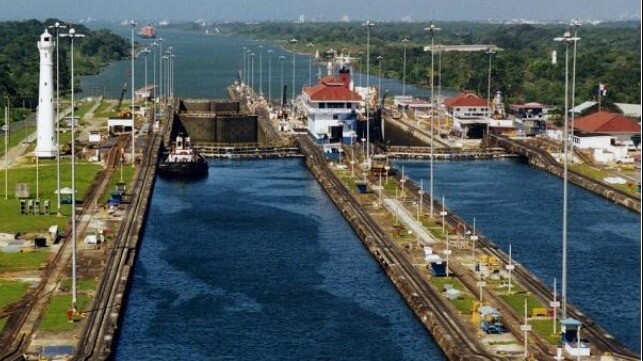Delays, Cancellations and Costs Mount as Panama Canal Reduces Transits

Concern is growing across the shipping industry as well as the potentially broader impact following the recent decision by the Panama Canal Authority to reduce the daily number of transits to conserve water. The authority said it working to address an ongoing drought that is not expected to lessen soon, but shipping companies are reporting increasing delays and added costs which had prompted some to look for alternatives and one cruise line canceled planned 2024 Panama Canal cruises.
Panama Canal Administrator Ricaurte Vásquez Morales has detailed the challenges they are facing due to the drought and after repeatedly lowering the draft limits, he announced the Panama Canal would maintain a draft of 44 feet in the coming months. He said this would be upheld “unless significant changes occur in weather conditions from the current projections.” To maintain the level the canal said it would only allow an average of 32 vessels per day to transit during this period, while suggesting the limits would remain in place into 2024.
The canal authority has been encouraging shipping companies to book their slots to minimize delays, but this is a costly process for the shipowners adding to the expense in addition to the transit fees. However, according to the ship agency Waterfront Maritime Services, it appears some ships are taking the advice. They reported last week that the number of vessels with bookings jumped from 38 to 54. However, another 83 ships, up by three, are also expected to arrive at the canal without bookings.
Waterfront Maritime Services also calculates that the waiting time for transits has already risen by approximately two days. Their report shows Neopanamax vessels were waiting last week 10 to 11 days for the northbound transit and as much as 15 to 16 days for the southbound transit. As part of the limit on the number of daily transits, the Panama Canal Authority set the maximum at 10 daily transits for the larger Neopanamax locks. Waterfront also reports for Supermax vessels the wait can now be between 15 and 18 days.
“The delays at the Panama Canal are having a ripple effect throughout the global economy,” said Thomas Zaidman, Managing Director of Sagitta Marine, a Panama-based dry bulk operator. “Ships that are delayed in the canal are forced to take longer routes, which increases fuel costs and shipping times. This can lead to higher prices for consumers and disruptions in supply chains.”
Some of the largest containerships are being forced to offload boxes for transshipment by rail across the isthmus. Evergreen’s Ever Max for example offloaded 1,400 TEU or nearly 10 percent of her load to make a transit on August 1. Some of the major shipping companies have responded to these issues by announcing surcharges on bookings transiting the canal. CMA CGM starting September 1 is expanding its Panama Canal surcharge of $300 per TEU to additional routes including trips to the U.S. East Coast and Gulf Coast. Starting in July, Hapag-Lloyd already introduced a surcharge of $260 per TEU.
At the same time, last week S&P Global in its Commodities Insights report said it was hearing that coal shipments were being impacted. Some carriers they reported are splitting shipments across two vessels while others were exploring diverting to trips around Cape Horn.
Similarly, Royal Caribbean International without supplying a reason has quietly withdrawn planned 2024 7-day cruises aboard the Rhapsody of the Seas cruise ship that were to have originated in Panama and transited the canal. Matt Hochberg reporting on the Royal Caribbean Blog says that passengers have been informed the cruises will now sail a 7-Night Southern Caribbean itinerary with stops in Aruba and Curacao.
The Panama Canal Authority understands the implications but reports it is balancing the issues to keep the canal functioning while also ensuring a drinking water supply for 50 percent of the country’s population served by the same reservoir. Last week discussing the challenges of managing the canal, Vásquez told reports their revenues might decline by as much as $200 million in the next fiscal year due to the water restrictions, but they were working hard to maintain the competitiveness of the Panama Canal and its vital role to the shipping industry.
No comments:
Post a Comment